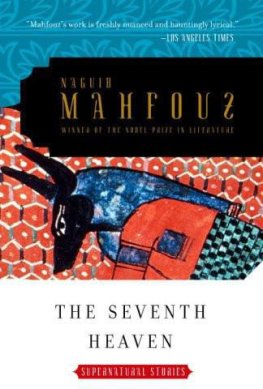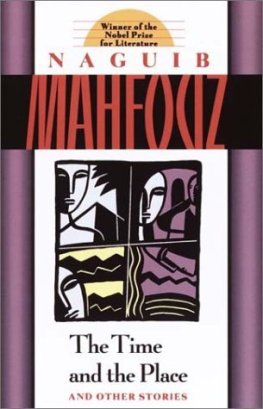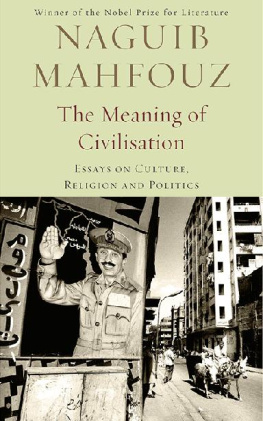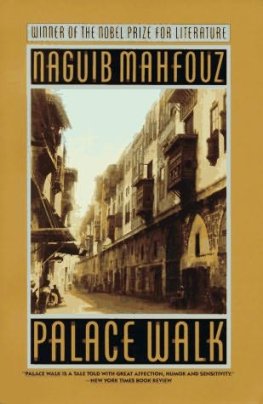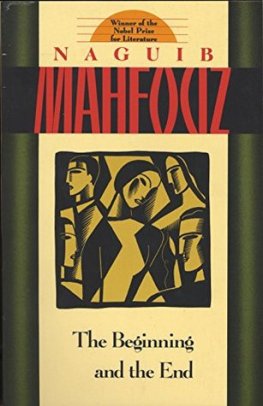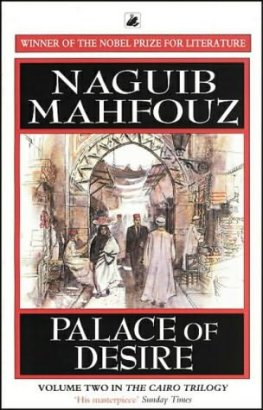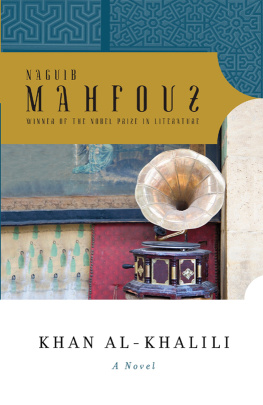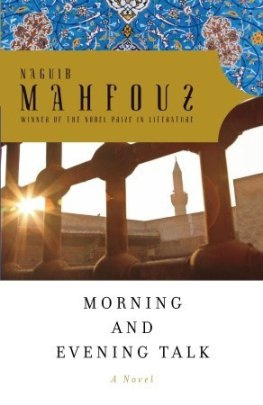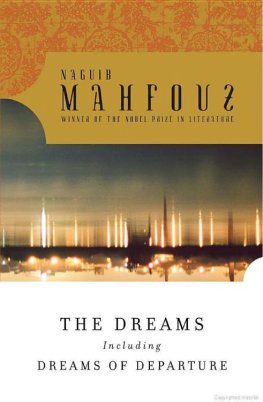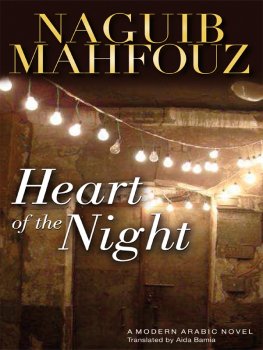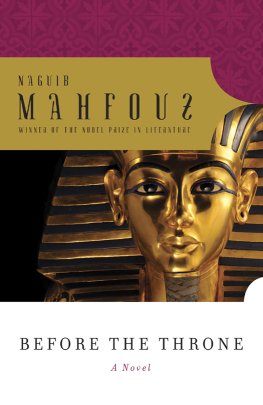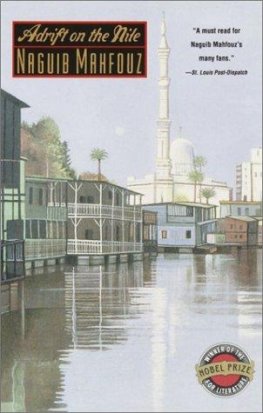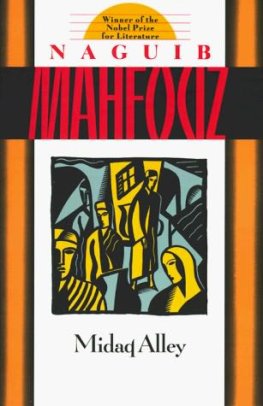Naguib Mahfouz
The Seventh Heaven
On Pembroke Road look out for my ghost
Dishevelled with shoes untied,
Playing through the railings with little children
Whose children have long since died.
Patrick Kavanagh1
Egyptian writer Naguib Mahfouz, who in 1988 became the first Arab Nobel laureate in literature, is justifiably known as one of the greatest realist writers of the last century. But he is equally a master of the bizarre, the supernatural, even the macabre.
To be sure, Mahfouzs oeuvre, encompassing some sixty books covering virtually every style and genre of fiction, is both vast and immensely varied. Best known for straightforward stories of life in his native city, such as his famous Cairo Trilogy (Palace Walk, Palace of Desire, and Sugar Street), so accurately does he capture the ways of the poor that it is said you can smell the popular quarters on the page. Yet in the same works and many others, he is just as adept at portraying the wealthy and the middle class, both women and men.
This same versatility extends to time and place as well: some of his earliest stories are highly readable (though for long, oddly underrated), increasingly allegorical romances set in his countrys rich pharaonic past. His first three historical novels, Khufus Wisdom, Rhadopis of Nubia, and Thebes at War, published in 1939, 1943, and 1944 respectively, have only recently appeared in English, along with a book of short stories set in ancient times, Voices from the Other World. His 1985 novella, Akhenaten, Dweller in Truth, about the pharaoh who suppressed worship of all deities but the sun god Aton, also came out in English less than a decade ago. These are only a few examples of the complexity of his output in the past seventy years or more.
But not only is Mahfouz brilliant at presenting the living, he is likewise uncanny at conjuring the dead.
For example, Mahfouzs 1945 story, A Voice from the Other World is told from the tomb by Taw-ty, a famous versifier and writer in a Nineteenth Dynasty court, who dies of a sudden illness at age twenty-six. Taw-ty watches as his family and friends mourn, bury, and ultimately forget him, while he himself discovers that one should embrace death, not avoid it. Consider his poetic description of his passing from this existence to the next, when the Messenger of the Hereafter comes to collect him:
And I saw the holy aura of life surrender to his will, and depart from my feet and my calves and my thighs and my belly and my chest, and the blood within them freeze and the limbs stiffen and the
heart stop, until a deep sigh escaped my gaping mouth. My corpse became quiet as I sank into eternity, and the Messenger took his leave just as he came to me, without anyones noticing. A peculiar feeling pervaded me that I had left life behind, that I had ceased to dwell among the people of the world.2
Despite a gap of thirty-four years between them, there is much in common between A Voice from the Other World and the title story here, The Seventh Heaven, published as al-Sama al-sabia in the 1979 collection al-Hubb fawq hadabat al-haram (Love on the Pyramids Plateau). Mahfouz says the idea for The Seventh Heaven came while reading a book on encounters with spirits of the departed by Raouf Sadiq Ubayd, former deputy chairman of the College of Law at Cairos Ayn Shams University. Ubayds work, al-Insan ruh la jasad (The Human Is a Spirit, not a Body, 1966),3 among much else about ghostly phenomena, contains previously unknown poetry allegedly recited in posthumous composition by the spirit of Egypts Prince of Poets, Ahmad Shawqi (18681932).4
The Seventh Heaven begins with the almost cinematically described murder of a twentieth-century man, one Raouf Abd-Rabbuh (literally, the Kind Servant of his Lordand not coincidentally including the same first name as the author whose book inspired the story; Mahfouzs characters are rarely, if ever, named at random). Raouf comes to incorporeal consciousness in the afterlife following his death at the hands of a friend with whom he is walking home at the end of a night out. Raouf watches dispassionately as his bloodied body is buried by his killer, Anous (derived from bachelor, man unable to marry) Qadri (compelled by fate, fateful) just as Taw-ty observes his own death and embalming in A Voice from the Other World; and in another story in the present collection, Beyond the Clouds (Fawq al-sahab, 1989), a likewise disembodied spirit watches his own family in the throes of grief around his corpse at the moment of his death. Raoufs soul is then received and counseled by a long-expired ancient Egyptian, Abu, formerly High-Priest at Hundred-Gated Thebes. Abu takes Raouf on a journey through what turns out to be but the first, or lowest, level of the seven heavens. These, of course, are undoubtedly based upon the seven heavens, one upon another arrayed (sabaa samawatin tibaqan)5 described in the Quran a concept that long predates Islam in the Near East. In Islamic cosmology, the first heaven is that just above the earth, at the level of the astral bodies, planets, and clouds, which sends rain to grow greenery below. The seventh heaven is where God sits on His throne, in firdaws (Paradise), above or near the sacred lote tree, the immortal Tree of Life. The travel distance in time between each heaven and the next in Islamic tradition (not in the Quran) is 500 years for a total journey far short of the hundreds of thousands of enlightened years cited in The Seventh Heaven.6 Yet humans are not physically reborn after death in the Quran (though the dead are to rise on the Day of Judgment). Nor do they return to earth as spiritual guides to the living, as they do in Mahfouzs story, let alone use such invisible influence to drive someone to suicide, as happens in one instance here.
Nor does this storys portrayal of the Other World bear much resemblance to the way the ancient Egyptians conceived it. For them, one either attained an afterlife by surviving the ritual weighing of the heart against the feather of Maat, goddess of order and justice, in the Osiris Court, or died forever as the sin-heavy organ was tossed to the crocodile-headed monster Ammit instead. And, while the number seven was considered fortuitous even in pharaonic times,7 eternity was essentially in the underworld, not in the heavens. Yet according to the tale of Setna and his son Si-Osiris (dating roughly to the first century A.D.), the boy and man pass through seven halls symbolizing the land of the Dead. In the seventh hall the place of judgment sat Osiris, ruler of the nether regions, with his divine entourage.8 But whatever the similarities and differences between his own post-mortem cartography and those of Islam and the ancient religion, Mahfouzs eschatology is even more unconventional in that he does not depict drastic torments for the truly wicked, but something far subtler than hellfire, or even simple non-existence (which the ancient Egyptians feared most). In The Seventh Heaven, the twentieth centurys two greatest villains, Adolf Hitler and Joseph Stalin, receive nothing more as chastisement than to be reborn in crude conditions on earth, while their quest for Paradise is merely delayed. The banality of evil is matched by the seeming triviality of punishment.
At times, Mahfouzs judgments in the story, The Seventh Heaven, may strike some as counterintuitive. The chief lackey to Hitlers reincarnation as Boss Qadri the Butcher is none other than Lord Arthur James Balfour (18481930), whose November 1917 promise on behalf of the British government to provide a homeland for the Jewish people in Palestine led to the creation of modern Israel. Yet, as viewed from within the Arab political scene since World War II, Mahfouz who has denounced the Nazis since their heyday, and who has told this writer that I really miss the Jews of Egypt9 (all but a handful of whom left in the 1950s and 60s) actually reverses here the popular order of villainy in his neighborhood. Throughout the Middle East, Balfour whose declaration led to the displacement of hundreds of thousands of Palestinians in 1948 and later (as well as the establishment of a haven for Jews persecuted throughout the world) is widely seen as sinister. Yet Hitler who millions of Arabs believed would liberate them from either British or French colonial rule has unfortunately been seen as a hero by many in the region. Moreover, in The Seventh Heaven, Mahfouz makes a sort of benevolent secular prophet out of Vladimir Ilyich Lenin (18701924), the ruthless founder of Soviet Communism and instigator of an enormous, and merciless, civil war throughout the Russian empire. He uses a common comparison between the allegedly just and saintly figure of Lenin and the malignant menace of his successor, Stalin. This view was and probably still is popular among many who consider themselves socialist and Mahfouz still holds it today.10

